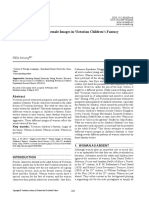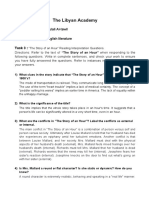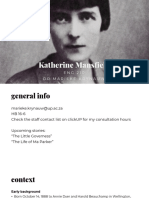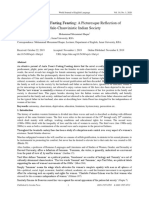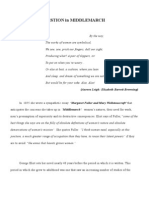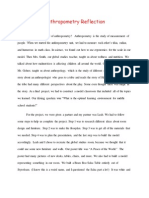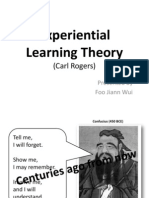Class Difference: The Garden Party: Fang 1
Class Difference: The Garden Party: Fang 1
Uploaded by
api-280290663Copyright:
Available Formats
Class Difference: The Garden Party: Fang 1
Class Difference: The Garden Party: Fang 1
Uploaded by
api-280290663Original Title
Copyright
Available Formats
Share this document
Did you find this document useful?
Is this content inappropriate?
Copyright:
Available Formats
Class Difference: The Garden Party: Fang 1
Class Difference: The Garden Party: Fang 1
Uploaded by
api-280290663Copyright:
Available Formats
Fang 1
Jingjing Fang
Dr. Sultzbach
English 204
17 April 2014
Class Difference: The Garden Party
Katherine Mansfields story, The Garden Party, begins with a rich family holding a
garden party. When they find out their poor neighbor died in an accident, the girl Laura thinks
they should stop the garden party. But others disagree; they think the garden party should be
held as planned, and it will end smoothly and happily. Everyone enjoys the garden party,
including the girl Laura herself. At last Laura brings the rest of the food from the party to
their poor neighbor. Her beautiful clothes and hat are not suitable to that sad environment.
When she saw the man who died in the accident, she cannot bear it anymore and she runs out
and cries, asking the question isnt life--? This shows that the experience of this event
makes her inner world grow and become mature; it allows her to reflect on the real world and
realizes that the gap between classes cannot disappear.
The best Victorian writers had not been afraid to ask difficult, unsettling questions
(1925). The people in the Victorian Age were full of enthusiasm of exploration because of
Colonialism and the Industrial Revolution. They thought they knew everything because they
were the citizens of the empire on which the sun never set. This notion faded with the death
of Queen Victoria, the overdeveloped Colonialism and Industrial Revolution, and the
beginning of Modernism. Modern explorations are undertaken with absolutely no
Fang 2
confidence as to the results that will be discovered, still less that a public exists who could
understand the writers discoveries (1925-1926). In the Modernist Era, womens rights
movements began, technology changed urban life, and the Great War took place. This society
made people feel scared and instable. With the Industrial Revolution, faster production of
goods enriched peoples lives and made them happier. This made their lives very busy with
these new material goods and made them dependent on superficial products as well. This
phenomenon made some people start to think about the problems in their society and exposed
class gaps between rich people and poor people.
At the same time, Darwins Evolutionary Theories claimed people evolved from apes.
Freuds psychological thoughts were that the fundamental driving force of all human
activities must be biological impulses and instincts. Freud believed that these core impulses
included the reproductive instinct (i.e. sexual instinct or sexual instinct). Social law, morality,
culture, and media repression were forced into sexual instincts repressed the subconscious, so
that people cannot enter into the consciousness level, and to allow social vent out the form,
such as literary, artistic creation. It made people in that time to start to write something to
express their feeling. When it comes to modernism, fictions are totally different from those of
the Victoria era, In the Victorian novel, plot crises were typically resolved in some definitive
way, such as by a marriage or a change in the financial statues of the protagonist. In the
modern novel, lasting resolutions growing out of a common vision are few and far between
(1934). However, Modern British literature is characterized by the increasing presence of
womens voice, working-class voice, and voice expressing varied ethnic, religious, and
sexual perspectives which whether methodically or inadvertently, had often been excluded
Fang 3
from the British literary tradition (1935). These fictions are more focused on an ordinary or
daily event and the characters are influenced by their psychological and physical instincts and
desires. The end of the fictions are often ambiguous, and the meaning or message of
these accounts are also instable and indefinite. For example, in Katherine Mansfields story,
The Garden Party, a womens voice, Laura recounts a daily event, the garden party, and an
accident that a poor neighbor died. Such events present Laura with an opportunity for
psychological and physical reflection, shows her reflection of real world, and the growing of
inner world and maturation, much like the people of the Modernist Era began to experience.
The readers who read these fictions will take from them different meanings based on
their social class and life experience. A Chinese writer, Zijian Yang said, reader group is a
complex group of factors that affect their many, country, race, gender, age, occupation, level,
hobbies, experiences, pursue and so on. It is the same reader at a different time and place
often has different psychological states and different aesthetic requirements. As we
discussed in class, Katherine Mansfields story The Garden Party could have two possible
meanings. One is that Laura has matures and recognizes that class prejudice exists and she
will not grow up to be like her family. The other one is that Laura shows she is ignorant of
real class struggle. How could people get two totally different meanings from one story? It is
because the readers are affected by many factors in their own lives that influence their
interpretation of the story. From the aspect of the optimist, people may get the first meaning
and think that Laura will be different from her family. From the view of people who have
experienced prejudice and low socioeconomic status, they may think Laura ignores the class
struggle and will be the same as her family.
Fang 4
As students who study literature, we read a lot about class struggles. Most of this
literature ends with the class gap is still existing and nothing changes. When we read The
Garden Party, we can jump into a conclusion that nothing will change and the class
prejudice is still there. In the story, it says as for the roses, you could not help feeling they
understood that roses are the only flowers that impress people at garden-parties; the only
flowers that everybody is certain of knowing. Hundreds, yes, literally hundreds, had come out
in a single night; the green bushes bowed down as though they had been visited by
archangels (1). In these sentence, the rose serves as an implicit metaphor. The tenor could be
rich people including Laura. Roses are the only flowers that impress people at gardenparties; the only flowers that everybody is certain of knowing. We can take from this that the
rich people are the only important people at garden-party; the poor people are not important.
Roses are the only flowers that people know, and this could signify that only rich people can
get peoples attention. The poor people who died in the story cannot get any attention, and
perhaps Laura only pays attention to the man because it happened near her house. The
Godbers man pays attention to the man because he thinks he has first-hand news he can talk
about: Only Goders man seemed to be enjoying himself; it was his story (6). The green
bushes are also an implicit metaphor, and the tenor is the poor people. The green bushes
bowed down as though they had been visited by archangels (1). Although everyone is equal
when they are born, these metaphors suggest that the poor people cannot exist on the same
level with rich people.
In the story, when Laura walked to the men who build the marquee, she blushed
because she had bread-and-butter in her hand, but there was nowhere to put it, and she
Fang 5
couldnt possibly throw it away (1). Laura is taught the rules and etiquette that is suitable
among upper class. It shows the big different between Laura and the men who build the
marquee, though Laura may think they can be friends despite her path toward becoming a
proper upper class citizen. She copies her mothers voice (1) because her mother is a
proper upper class person. The mother is the model for Laura, and when she grows up, she
aspires to become a woman like her mother. There, quite by chance, the first thing she saw
was this charming girl in the mirror, in her black hat trimmed with gold daisies, and a long
black velvet ribbon. Never had she imagined she could look like that. Is mother right (8).
Lauras mother passes her hat down to Laura, and this shows that what she passes down
could be prejudice toward the lower class. When Laura wears the hat, she changes. She thinks
that the garden party can go on. When Laura was wearing her mothers hat, she thinks that
she never had she imagined she could look like that, and this shows that maybe Laura
never think about that she could like her family. When she wear the hat, she realizes that her
mother is right, she is same like her family and she will never get rid of it. When Laura sees
that the man who built the marquee had a haggard look as his dark eyes scanned the tenniscourt. What was he thinking? (2). When she talks with her brother, she couldnt explain. No
matter. He quite understand (12). These examples show that Laura cannot understand the
lower class people because the gap between them is very big; her brother can understand her
only because they are in the same class.
In conclusion, Katherine Mansfields story, The Garden Party, shows the experience
and events of a garden party and accident of a poor man. These events make the protagonists
inner world grow and become mature; shes able reflect on the real world and understand that
Fang 6
the gap between class not only exists but also cannot disappear. This reflection resembles the
new ways of thinking that emerged as a result of the Modernist Era. Part of this type of
thinking includes the idea of ambiguity- people can get different meanings from one texts
overall message. Although people will get different meanings from one story, the message
that the story wants to express is still the same.
Fang 7
Work Cited
Katherine Mansfield, The Garden Party, KatherineMansfieldSociety. 2014.3.28
Sigmund Freud, Biography of Sigmund Freud, Baidu. 2006.4.22/2014.3.15. 2014.4.5
Zijian Yang, Biography of Zijian Yang, Baidu. 2008.5.4/2013.1.30. 2014.4.5
You might also like
- Student Assessment: Sitxccs008 Develop & Manage Quality Customer Service PracticesDocument51 pagesStudent Assessment: Sitxccs008 Develop & Manage Quality Customer Service PracticesJB Nery Dela Cruz80% (5)
- Analysis of The Short Story "Passion" by Alice MunroDocument6 pagesAnalysis of The Short Story "Passion" by Alice MunroEasha ZainabNo ratings yet
- Arthur Asa Berger-Narratives in Popular Culture, Media, and Everyday Life-SAGE Publications, Inc (1996)Document217 pagesArthur Asa Berger-Narratives in Popular Culture, Media, and Everyday Life-SAGE Publications, Inc (1996)Jana AtraNo ratings yet
- CRD SubsampleDocument34 pagesCRD SubsampleFahmy Abo Walid Kseibi100% (3)
- A Brief History of NewspapersDocument16 pagesA Brief History of NewspapersAkshay KatiraNo ratings yet
- Analysis of The Narrative Perspective of KatherineDocument16 pagesAnalysis of The Narrative Perspective of KatherineAlaydin YılmazNo ratings yet
- Understanding The SelfDocument4 pagesUnderstanding The SelfKevin0% (1)
- Jiva Goswami Gopala CampuDocument255 pagesJiva Goswami Gopala CampuJSK100% (1)
- SOP Cranfield 2nd Itr 12fontDocument2 pagesSOP Cranfield 2nd Itr 12fontVishant GoelNo ratings yet
- Dungeon World - Druid Character SheetDocument2 pagesDungeon World - Druid Character SheetGabe JohannsNo ratings yet
- EXAMEN LITERATURA NORTEAMERICANA - EditedDocument12 pagesEXAMEN LITERATURA NORTEAMERICANA - EditedkpullodemamaNo ratings yet
- The Hand Maids Tails NotesDocument13 pagesThe Hand Maids Tails NotesgraumanmosheNo ratings yet
- Class Conciousness and LiteratureDocument5 pagesClass Conciousness and LiteratureRatnasiri ArangalaNo ratings yet
- ALC Final Exam PaperDocument8 pagesALC Final Exam PaperJulia PearlNo ratings yet
- Detailed Summary of The Golden NotebookDocument16 pagesDetailed Summary of The Golden Notebookhashemfamilymember100% (3)
- LiteratureDocument4 pagesLiteraturechathuikaNo ratings yet
- Can Lit AssignmentDocument6 pagesCan Lit AssignmentEasha ZainabNo ratings yet
- 18.ijoes - Pakistan - 123-134Document12 pages18.ijoes - Pakistan - 123-134Sonia ELTNo ratings yet
- Dalagang Gulang: The Old Maid in Cebuano Short Fiction by WomenDocument14 pagesDalagang Gulang: The Old Maid in Cebuano Short Fiction by Womenbabyu1No ratings yet
- Parable of The Sower, by Octavia E. Butler, Brings Back Many Familiar Themes FromDocument8 pagesParable of The Sower, by Octavia E. Butler, Brings Back Many Familiar Themes FromPoet CruzNo ratings yet
- Brief Talk On The Alienation of Human Nature - From A Curtain of Green and Other StoriesDocument3 pagesBrief Talk On The Alienation of Human Nature - From A Curtain of Green and Other StoriesJhon Renren LogatocNo ratings yet
- The Garden PartyDocument8 pagesThe Garden PartyKlára HromkovičováNo ratings yet
- Mrinal's Journey From "A Doll's House" Tothe World of Emancipation in Rabindranathtagore's "Streer Patra" (The Wife's Letter)Document15 pagesMrinal's Journey From "A Doll's House" Tothe World of Emancipation in Rabindranathtagore's "Streer Patra" (The Wife's Letter)Mohammad Kaosar AhmedNo ratings yet
- "Angels in The House": Female Images in Victorian Children's FantasyDocument7 pages"Angels in The House": Female Images in Victorian Children's FantasyIuliana ParaschivNo ratings yet
- Katherine MansfieldDocument2 pagesKatherine MansfieldpaolasanlesNo ratings yet
- Rosenberg Seeds in Hard GroundDocument12 pagesRosenberg Seeds in Hard GroundPaigeNo ratings yet
- The Role of Women's Memoirs in Bengali and World LiteratureDocument5 pagesThe Role of Women's Memoirs in Bengali and World LiteratureSongborto BiswasNo ratings yet
- Mrs Dalloway Themes Term PaperDocument5 pagesMrs Dalloway Themes Term Paperc5p4r60c100% (1)
- English IODocument4 pagesEnglish IODemiladeNo ratings yet
- We Said Feminist Fairy Tales, Not Fractured Fairy Tales!Document5 pagesWe Said Feminist Fairy Tales, Not Fractured Fairy Tales!Zhu KristinaNo ratings yet
- The Pivotal Theme of The Garden Party StoryDocument1 pageThe Pivotal Theme of The Garden Party StoryJahangir AlamNo ratings yet
- A Psychoanalytic-Feminist Reading of Martha's "Battle" With Mrs. Quest in Doris Lessing's Martha QuestDocument8 pagesA Psychoanalytic-Feminist Reading of Martha's "Battle" With Mrs. Quest in Doris Lessing's Martha QuestMohammad Kaosar AhmedNo ratings yet
- Four Feminist Novels Margaret Atwood: Helge Normann NilsenDocument14 pagesFour Feminist Novels Margaret Atwood: Helge Normann Nilsenbanupriya.p2002No ratings yet
- Alienation, Isolation, Loneliness and The GrotesqueDocument7 pagesAlienation, Isolation, Loneliness and The GrotesqueVikramjeet SinghNo ratings yet
- O Brawe New WorldDocument5 pagesO Brawe New Worldseva.rus01No ratings yet
- The Garden Party ++ RESEARCH PAPERDocument7 pagesThe Garden Party ++ RESEARCH PAPERIshtiaq AhmedNo ratings yet
- Brave New World Research Paper ThesisDocument6 pagesBrave New World Research Paper Thesisj0lemetalim2100% (1)
- Review of Short StoryDocument8 pagesReview of Short Storycarl vens ranolaNo ratings yet
- Analysis of Short Stories in The Collection " Interpreter of Maladies" by Jumpa LahiriDocument4 pagesAnalysis of Short Stories in The Collection " Interpreter of Maladies" by Jumpa LahirirajlakshmibaburajNo ratings yet
- A Dolls House Feminist ThesisDocument8 pagesA Dolls House Feminist Thesisadrianawilsonpaterson100% (2)
- Book Club Discussion Guide - KindredDocument3 pagesBook Club Discussion Guide - KindredLily LiNo ratings yet
- Bluest Eye Research PaperDocument6 pagesBluest Eye Research Paperhupqxogkf100% (1)
- 7 1 Anglin-JaffeDocument18 pages7 1 Anglin-JaffeMarijoNo ratings yet
- Economics EssayDocument6 pagesEconomics Essayezknbk5h100% (2)
- The Libyan Academy: Name: Tasneem Abdulali Al-Tawil ID: 21981782 Subject: Teaching English Literature Task 3Document4 pagesThe Libyan Academy: Name: Tasneem Abdulali Al-Tawil ID: 21981782 Subject: Teaching English Literature Task 3Tasneem Al-tawilNo ratings yet
- Analysis Brave New WorldDocument3 pagesAnalysis Brave New WorldAlexis Gonzalez100% (1)
- SFL of Short StoryDocument11 pagesSFL of Short StoryAnmol QureshiNo ratings yet
- LECTURE1Document9 pagesLECTURE1Chriza Mae DandoNo ratings yet
- Essay On HeroDocument4 pagesEssay On Heroafibojmbjifexj100% (2)
- L1 MansfieldDocument25 pagesL1 MansfieldAlexandra TsatsoulisNo ratings yet
- 1 PB 2Document13 pages1 PB 2Nidhi PatilNo ratings yet
- Power of EducationDocument13 pagesPower of EducationAuto MeNo ratings yet
- Contemporary American Literature: Donna TarttDocument6 pagesContemporary American Literature: Donna Tarttpaula.mrtynNo ratings yet
- Incidents in The Life of A Slave Girl EssayDocument5 pagesIncidents in The Life of A Slave Girl Essaymkiyvubaf100% (2)
- Brave New World Analysis PaperDocument7 pagesBrave New World Analysis PaperSamantha BoydNo ratings yet
- Woman Question in Middle MarchDocument6 pagesWoman Question in Middle MarchTathagata Dutta100% (5)
- Queering Social AtonementDocument14 pagesQueering Social Atonementapi-440171708No ratings yet
- English 2200 Response Paper 1Document6 pagesEnglish 2200 Response Paper 1londonNo ratings yet
- The Shadow Lines SummaryDocument7 pagesThe Shadow Lines Summary19BEN1030-Pushpapriya .SNo ratings yet
- Chinniliteraryanalysis 1Document6 pagesChinniliteraryanalysis 1api-296964734No ratings yet
- Female IdentityDocument9 pagesFemale IdentityMaiElGebaliNo ratings yet
- The Lottery Shirley Jackson Thesis StatementDocument4 pagesThe Lottery Shirley Jackson Thesis Statementh0dugiz0zif3100% (2)
- Biblical and Historical Allusions in MarDocument8 pagesBiblical and Historical Allusions in MarAlejandroNo ratings yet
- Jingjing Fang Beat Report 1Document1 pageJingjing Fang Beat Report 1api-280290663No ratings yet
- Mr. Hyde, The Desires of Human: Fang 1Document6 pagesMr. Hyde, The Desires of Human: Fang 1api-280290663No ratings yet
- Expanding The Pump House:: Memberships, Sponsorships, and DonationsDocument15 pagesExpanding The Pump House:: Memberships, Sponsorships, and Donationsapi-280290663No ratings yet
- FinalinvestgativereportDocument7 pagesFinalinvestgativereportapi-280290663No ratings yet
- Top Foods To Avoid On The Keto Diet: ProketotipsDocument4 pagesTop Foods To Avoid On The Keto Diet: ProketotipsIoana Borcea100% (1)
- Anthropometry ReflectionDocument2 pagesAnthropometry ReflectionTessNo ratings yet
- TDS LF-301Document1 pageTDS LF-301Ofer ShochetNo ratings yet
- Project SAGIPDocument7 pagesProject SAGIPHardy Misagal100% (2)
- Inner Peace Inner Power Book 1Document92 pagesInner Peace Inner Power Book 1Fernando NunezNo ratings yet
- Science Topic GlocalizationDocument35 pagesScience Topic Glocalizationharold bondocNo ratings yet
- Remaining WorksDocument5 pagesRemaining Worksr_massora5485No ratings yet
- Rios, Punished - CH 1Document22 pagesRios, Punished - CH 1sciencegirls314No ratings yet
- JCB Bill 2Document1 pageJCB Bill 2Best Auto TechNo ratings yet
- North South University Summer 2020 BUS 516: Computer Information Systems Individual Term Paper Instructor: Dr. Ummaha HazraDocument2 pagesNorth South University Summer 2020 BUS 516: Computer Information Systems Individual Term Paper Instructor: Dr. Ummaha HazraBk KundoNo ratings yet
- Annals of Gastroent Surgery - 2023 - Iwatsuki - The Comprehensive ReviewDocument8 pagesAnnals of Gastroent Surgery - 2023 - Iwatsuki - The Comprehensive ReviewSCJUBv Chirurgie INo ratings yet
- Joe Dispenza-Evolve Your BrainDocument35 pagesJoe Dispenza-Evolve Your Brainn6YvhCZwy100% (1)
- Magnets (1) UnlockedDocument3 pagesMagnets (1) UnlockedHarden13 YeNo ratings yet
- Experiential Learning TheoryDocument14 pagesExperiential Learning TheoryMaheshNo ratings yet
- CRE-AIIMS Advertisement v7Document96 pagesCRE-AIIMS Advertisement v7Rajveer SinghNo ratings yet
- Form 2 (See Rules 10, 14, 17 and 18) : Appl No:4037652220 Dt:30-12-2020Document2 pagesForm 2 (See Rules 10, 14, 17 and 18) : Appl No:4037652220 Dt:30-12-2020Hardik SainiNo ratings yet
- Sakshi Project Main ContentDocument9 pagesSakshi Project Main ContentVirendra NawkarNo ratings yet
- Training and Development From A Change Model PerspectiveDocument14 pagesTraining and Development From A Change Model Perspectivehas_lida2004No ratings yet
- 2 ND Work Memo C R F D Y ROADDocument16 pages2 ND Work Memo C R F D Y ROADPhani PitchikaNo ratings yet
- Cavite Mutiny 12 Events That Have Influenced Philippine History Publications - StuartXchangeDocument4 pagesCavite Mutiny 12 Events That Have Influenced Philippine History Publications - StuartXchangeriki maeNo ratings yet
- Tag Question: 1. Positive Sentence, Negative TagDocument3 pagesTag Question: 1. Positive Sentence, Negative TagPanjul IdNo ratings yet
- LIT1 Lesson2Document6 pagesLIT1 Lesson2lhyka nogalesNo ratings yet

























